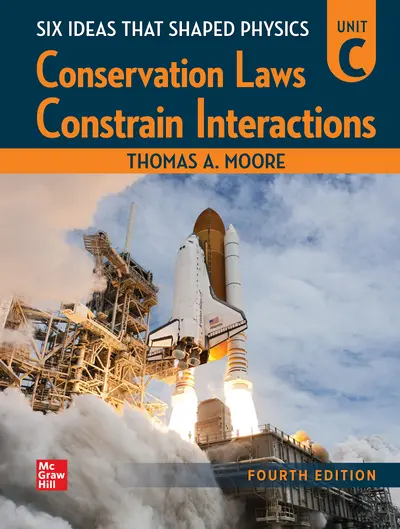My Account Details

ISBN10: 1260721752 | ISBN13: 9781260721751

* The estimated amount of time this product will be on the market is based on a number of factors, including faculty input to instructional design and the prior revision cycle and updates to academic research-which typically results in a revision cycle ranging from every two to four years for this product. Pricing subject to change at any time.
Instructor Information
Quick Actions (Only for Validated Instructor Accounts):
Six Ideas that Shaped Physics is comprised of six units, providing a unique approach to a two- or three-semester calculus-based introductory physics course. The text is designed to teach students to apply basic physical principles to realistic situations, and to resolve contradictions between their preconceived notions and the laws of physics. Through integrated practice, students learn to solve realistic problems, and organize the ideas of physics into an integrated hierarchy.
The six units are:
Unit C: Conservation laws constrain interactions
Unit N: The laws of physics are universal (Newtonian mechanics)
Unit R: The laws of physics are frame-independent (Relativity)
Unit E: Electricity and magnetism are unified
Unit Q: Matter behaves like waves (Quantum physics)
Unit T: Some processes are irreversible (Thermal physics)
C1 The Art of Model Building
C2 Particles and Interactions
C3 Vectors
C4 Systems and Frames
C5 Conservation of Momentum
C6 Conservation of Angular Momentum
C7 More About Angular Momentum
C8 Conservation of Energy
C9 Potential Energy Graphs
C10 Work
C11 Rotational Energy
C12 Thermal Energy
C13 Other Forms of Internal Energy
C14 Collisions
Accessibility
Creating accessible products is a priority for McGraw Hill. We make accessibility and adhering to WCAG AA guidelines a part of our day-to-day development efforts and product roadmaps.
For more information, visit our accessibility page, or contact us at accessibility@mheducation.com
Affordability
Reduce course material costs for your students while still providing full access to everything they need to be successful. It isn't too good to be true - it's Inclusive Access.
Need support? We're here to help - Get real-world support and resources every step of the way.